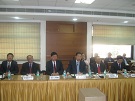A five-member delegation from China Institute of International Strategic Studies (CIISS), led by Maj Gen (Retd) Zhu Da, Vice Chairman, and comprising Maj Gen (Retd) Zhang Jianguo, Senior Advisor, Mr Li Jie, Executive Secretary General, Senior Col (Retd) Lin Yu, Senior Research Fellow, and Mr He Botao, Assistant Research Fellow as members of the delegation, interacted with the VIF faculty on 02 Dec 2014. The interaction covered a broad spectrum of bilateral issues, including, among others, the regional cooperation on terrorism and Afghanistan, and the evolving security situation internationally. General (Retd) NC Vij, Director VIF, welcomed the delegation and briefed them about the outcome of his recent delegation level visit to China for a trilateral conference on Afghanistan’s future. In his opening remarks, the Director said that improvement in bilateral ties between China and India, particularly their economic cooperation, is crucial for the economic well being of the two countries as also for the region’s peace and security. He flagged unresolved border dispute between China and India and China-Pakistan nuclear collaboration as areas of major concern for India. While he urged for better clarity in China’s India policy, he also suggested both countries exchange maps delineating their perceptions of the borders as part of Confidence Building Measures (CBMs).
Sharing his perception of Sino-Indian relations, Maj Gen (Retd) Zhu Da said India forms an important part of China’s foreign policy calculus, underlined by development imperatives and peaceful co-existence among the neighbours. He listed out big power relationship, relationship with peripheral countries, development imperatives, and multilateralism as among the core principles of China’s foreign policy under the leadership of President Xi Jingping, adding further that India fits well into all of these categories. He also stated that while China has retained continuity in its foreign policy, it is also trying to adapt itself to the changing dynamics of international situation.  China would want to evolve its relationship with India in a manner that can be emulated by other countries as well. Responding to India’s sensitivities vis-à-vis the lingering border tension, the Chinese General said preparations are underway to resolve the border dispute. He, however, suggested that India and China move forward in their relationship while keeping the border issue at bay, a suggestion that was questioned by the VIF experts. The latter argued that economic cooperation between China and India can not substantially progress unless the border dispute reaches an amicable settlement. They also expressed their amazement as to how PLA (People’s Liberation Army) managed to embarrass their own President during his recent visit to India by creating unnecessary tension along the borders with India.
China would want to evolve its relationship with India in a manner that can be emulated by other countries as well. Responding to India’s sensitivities vis-à-vis the lingering border tension, the Chinese General said preparations are underway to resolve the border dispute. He, however, suggested that India and China move forward in their relationship while keeping the border issue at bay, a suggestion that was questioned by the VIF experts. The latter argued that economic cooperation between China and India can not substantially progress unless the border dispute reaches an amicable settlement. They also expressed their amazement as to how PLA (People’s Liberation Army) managed to embarrass their own President during his recent visit to India by creating unnecessary tension along the borders with India.
The interaction witnessed a whole lot of prickly issues between China and India being thrown up for discussion, including the Indo-US strategic partnership and China-Pakistan nuclear collaboration. As regards the deepening strategic engagements between India and US, the visiting delegates said China has no problem with India pursuing relationship with any other country. However, such relations should not impact China’s interests. The same also holds true for China-Pakistan relations, the VIF experts argued. There was near consensus across the table that both China and India need to remain sensitive to each other’s concerns. 
Adding to the list of potential CBMs between China and India, the Indian analysts suggested that both countries jointly undertake environmental assessments of building large dams in the ecologically fragile Tibetan region. In so far as regional cooperation between the two countries is concerned, it was mutually agreed that China and India need to team up their efforts in stabilizing Afghanistan, a prerequisite for achieving peace and security in the region. Harping on the flawed strategy of distinguishing between good and bad terrorists, they also stressed on the need for China to remain alive to potential terrorist threats arising out of Pakistan’s FATA (Federally Administered Tribal Areas) region. It was also mutually agreed upon by the two sides that ensuring peace and stability is a precondition to economic development in the region as such it is incumbent upon both China and India to maintain good neighbourly relations. With Gen Vij moderating the discussion, others who actively participated in the interaction from the VIF side included Amb. TCA Rangachari, Lt Gen (Retd) Ravi Sawhney, Amb R Rajagopalan, Amb Rajiv Sikri and Dr. Harinder Sekhon.









